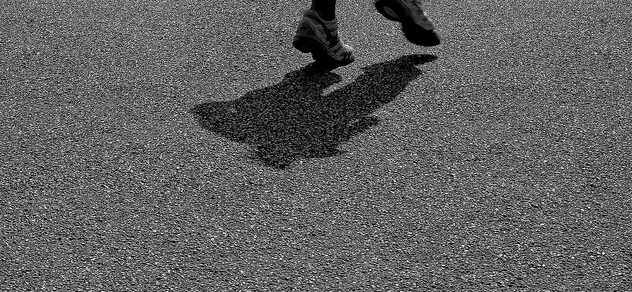My mother thinks I should run. She tells me this in the living room. She is folding laundry. She has the blue, kidney shaped laundry basket on a chair by the table. I can’t see any of this, but it registers with my awareness, and my memory supplies the images. I have been blind for just over a year.
A year ago, I ran. I rode my bike and played baseball, even though I wasn’t very good. I was full of energy and confusing emotions.
Then the car accident took my sight and changed who I am so completely that I sometimes feel like another person. There was the person I was before and the person after. These versions of me remain forever divided. Now, there is my blindness, which is an unwelcome part of everything I do. But I can’t use the word—not easily. My blindness is not me, it’s an angry dog, blocking my way. Every time I try to move, it’s there,forcing me back or making me take a different way.
My mother is aware of my frustration, if nothing else. She is trying to help, which I don’t like. If I acknowledge her need to help, then I have to admit something is wrong.
But I’m eleven-years-old, and I lack the ability to tease these things apart—or even to articulate them. At the time, I mostly have a sense of wrongness—I feel as though I’m the problem, something added to the weight of responsibility my parents already bear. I don’t like it.
***
We walk to the old stadium on a sunny morning. It lies five blocks to the south. This is my mother’s idea. My brother comes with us. He is younger than me, he goes to a special school, and my mother won’t leave him on his own.
We find the field. She walks away from me, perhaps a hundred feet, but I can’t tell. I can’t judge distances. Not like I used to.
She calls to me. “Run!”
I don’t have my white cane. She took it with her. This is hard, harder than I thought possible. If I’m to run blind, what’s to stop me from running into something, or falling and hurting myself.
***
The other me ran all the time. I ran up and down the street, playing tag or football or street hockey. I ran to and I ran from.
I got in a fight once, right on our front lawn. Other kids gathered in a circle. It was with Craig; he was supposed to be my friend. I should have remembered that before I called him names. I was angry, even then. Head down, shoulders hunched, he danced stiffly towards me. He had an advantage—not only was he a year older, he had four older brothers who had taught him to fight.
It didn’t last long. I ran away when it was over, my jacket torn, my body on fire with shame and resentment. I hated Craig; I hated everyone who gathered in that circle and watched. I ran hard, down the street and around the corner. Then another half a block before cutting through a garden that bordered the main sidewalk.
I forgot about the fence Mr. McFee set up to enclose his garden. It’s not much of a fence, more a wire strung between metal posts driven into the ground. But it’s as good as a tripwire, and I land face-down in the dirt, full of humiliation.
It’s the interval I don’t remember—the space between tripping on the wire and hitting the ground. It’s no more than half a breath of time, but it’s as though I can’t recall it, even in the moment. The air is forced from my lungs in an astonished squawk as I hit the ground, soI lie there, momentarily in shock from the impact. Then I cry, more out of a sense of helplessness than anything else.
***
The accident is like this—it’s what I don’t remember that is most troubling. I’m in a truck with my cousins. A blank space. Then, somehow, I can hear my elder cousin above me shouting our names, but I can’t answer. I remember before, and I remember after, but I can never recall the impact.
Running into things is hard, and now I do it all the time. My shame reverberates like a bell every time I crash. I use a white cane, but it doesn’t always protect me. I bear bumps and bruises from crashes and falls. Every inch of my forehead has sported a goose-egg sized bump at one time or another.
My body remembers each of these impacts, especially the one that took my sight. Every time I crash, there’s an echo of that crash. The impact that my body remembers, but I can’t bring to mind.
And now, my mother wants me to run. She thinks it will help me burn off steam. That’s what she says, burn off steam. Like an old engine with no where to go. And this is supposed to help?
But I run. The ground hammers away under my feet; the sun warms my face.
I run.
There’s a wind, and my mother’s voice is far away. That’s my world for as long as I run; the ground, the wind, the sun, my mother’s voice.
I still don’t like it, but I run anyway. My feet hammering out the anger on the stiff turf, while I hang suspended in a world that rolls away beneath my feet.
William Thompson is totally blind, and he teaches children’s literature for MacEwan University in Edmonton, Canada. His work has appeared in Firewords Magazine, Hippocampus Magazine, Penmen Review, Ponder Review, Wanderlust Journal, and Literary Orphans. He has two collections of stories—The Paper Man and Other Stories, and Fractured and Other Fairy Tales—both available on Amazon. He also maintains a blog at www.OfOtherWorlds.ca

